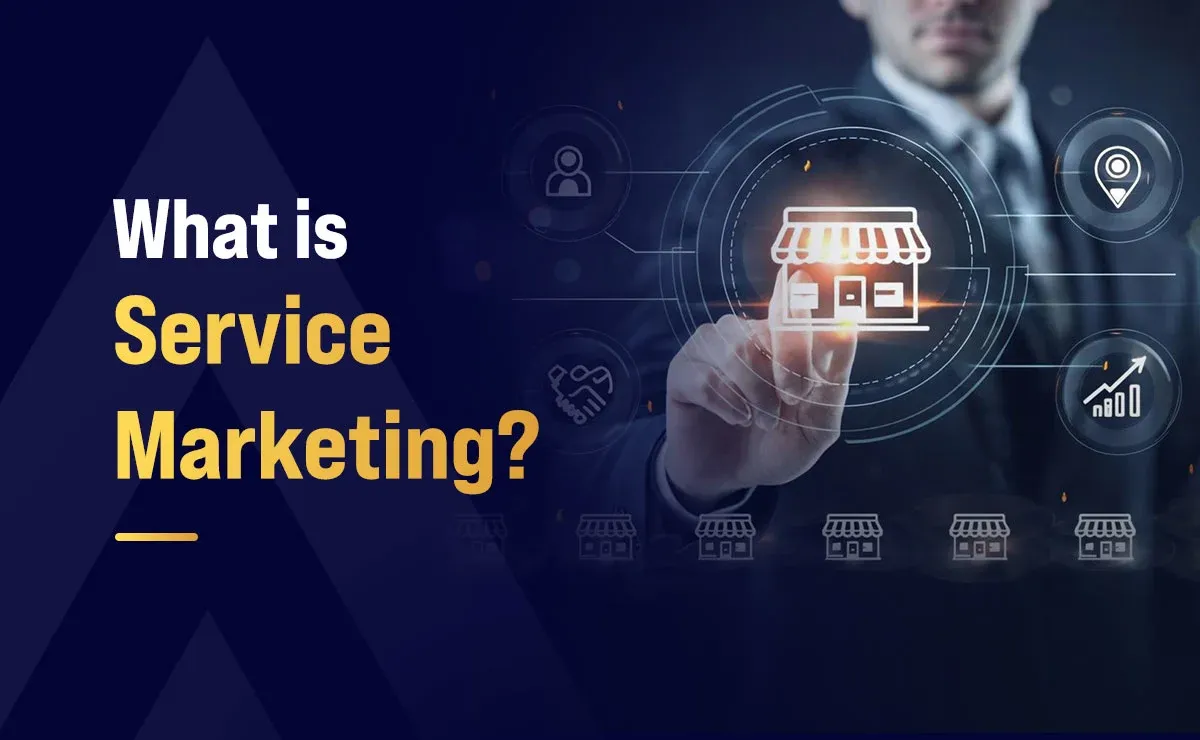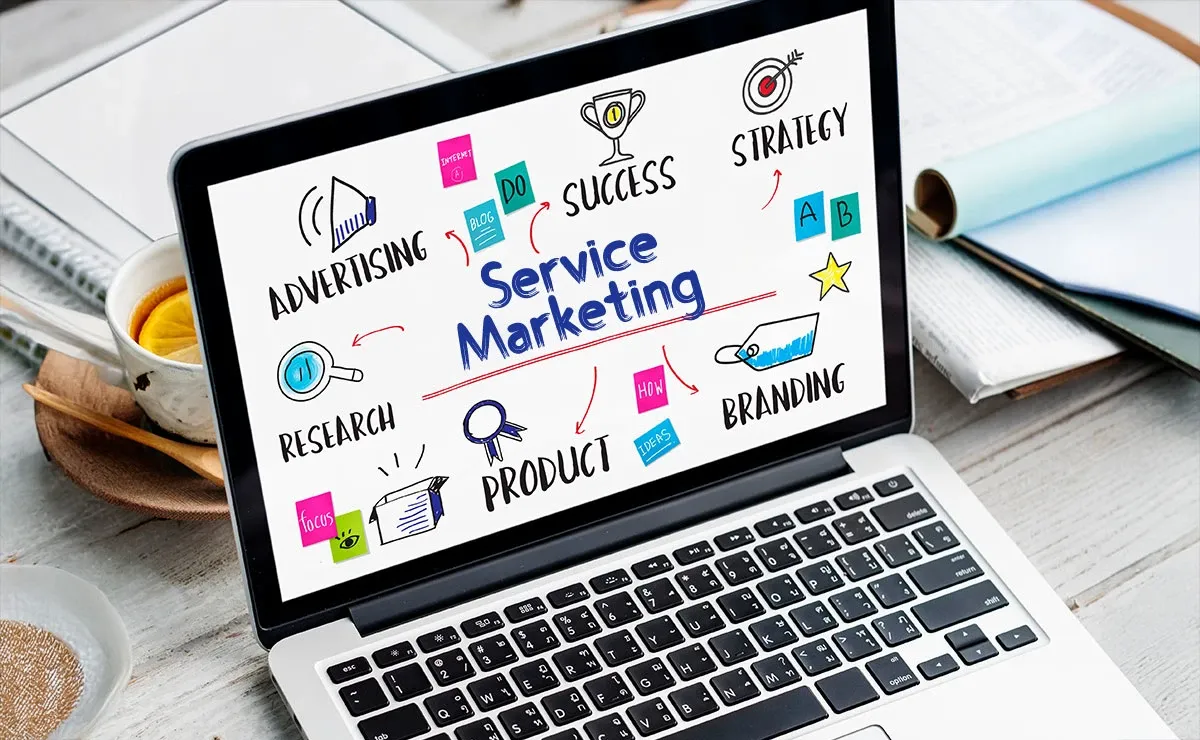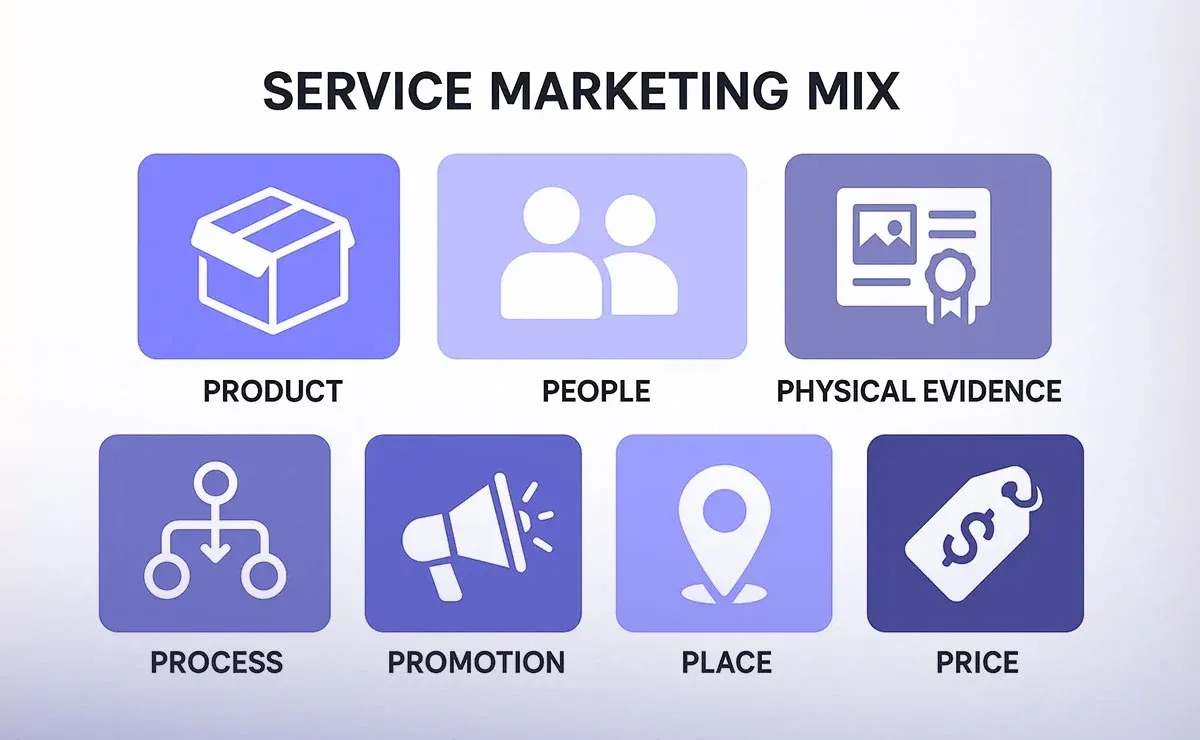What is Service Marketing?

In a world where service industries are becoming increasingly dominant, it has never been more essential to understand the intricacies of service marketing. Services are an important part of our lives, whether it comes to making a hotel reservation, meeting with a financial advisor, or even enrolling in an online course.
Service marketing can be defined as the art of marketing, selling, and offering services in intangible forms to a specified group of consumers. It focuses on value addition, customer satisfaction, and customized communication in order to market services within competitive settings.
Services cannot be felt, unlike tangible goods, which makes their marketing more unique and more complicated. This article explores the principles of service marketing, offering a comprehensive guide on how students and practitioners can grasp the key concepts, best practices, and the critical importance of service marketing.
Learning service marketing is not merely theoretical; it involves putting it into practice within business settings. If you're aiming to build a career where you can put these concepts into action and grow with hands-on experience, our Post Graduate Program (PGP) might be a great next step. Explore how we help learners like you become industry-ready on our main site.
What is Services Marketing with Examples?

Service marketing is a form of marketing and selling intangible services (as opposed to tangible products) to a target audience. It is also concentrated on the value of creation for customers, where the benefits, expertise, and experiences of the service are emphasized. In comparison to product marketing, service marketing highlights the advantages of services that customers cannot see or feel.
Service marketing is especially relevant in the contemporary economy, where service-based industries, including healthcare, education, hospitality, and technology, dominate the economy. By identifying the unique features of service marketing, professionals can design strategic solutions to meet the constantly changing needs of their audience.
Examples of Services Marketing
Services marketing can be found in a wide range of industries and customer requirements. The following are some of the notable examples:
- Telecommunications: Telecom firms employ service marketing to market their data plans, call packages, and internet services. Strategies are commonly aimed at achieving reliability, speed, and excellent customer service to gain and retain subscribers.
- Health and Wellness: Gyms, wellness coaches, and therapy services are promoted via service marketing. They leverage visuals, testimonials, and clear descriptions of the benefits to create a tangible perception of their services.
- Design, Marketing, and Creative Services: Freelancers and agencies specializing in graphic design, digital marketing, or content creation market their portfolios, creative approaches, and successful campaigns via service marketing.
- Restaurants and Catering Services: Restaurants and catering services utilize service marketing to showcase their ambiance, distinctive cuisine, ability to create customized menus, and exceptional service at events.
- Consulting Services: Management and IT consultants sell their skills through service marketing, demonstrating client success stories, certifications, and testimonials.
- Trade Services: Trade workers, such as plumbers and electricians, advertise their expertise and dependability to prospective customers. They also tend to focus on certifications, guaranteeing on-time service, and customer reviews.

These illustrations demonstrate that marketing services can be highly adaptable in most industries. Serving customers and mitigating specific pain points can help service-based businesses develop effective campaigns that attract and retain their target audience.
Service Marketing Characteristics
Product marketing and service marketing are very different because of the difference between products and services. It is essential for service businesses to recognize these distinctive features, as they directly impact the creation of an effective marketing strategy. Service marketing is characterized by the following features:
1) Intangibility:
Services are not physical, and so they cannot be touched, viewed, or stored in the same way that products can. This presents a challenge to marketers because the customers cannot evaluate the service before they experience it.
To overcome this, service marketing first builds a strong brand identity and utilizes customer testimonials or case studies to demonstrate the value of its services.
2) Inseparability:
In contrast to goods that are manufactured, stored, and sold later, services are created and consumed simultaneously, making the provider-customer interaction a pivotal part of the process.
This implies that service marketing depends on well-trained and skilled employees who will provide consistent and good experiences.
3) Variability:
The quality of the service may vary depending on the person delivering it, the timing of service delivery, and the location of service delivery. This inconsistency may negatively impact customer satisfaction.
An example would be that the advice given by a consultant would vary depending on the consultant's expertise or even their mood on a given day. In order to be consistent, business organizations need to invest in training, standardization, and continuous monitoring in order to uphold high-quality service.
4) Perishability:
Because services cannot be stored, they are inherently perishable and must be used within a specific time frame. For example, if a flight seat remains unsold, it cannot be resold once the flight departs. Service marketing often focuses on demand management to optimize availability and minimize wasted service capacity.
Promotional strategies, such as limited-time offers, early-bird offers, or dynamic pricing, can be used to control demand and minimize the risk of underutilization.
Value of Service Marketing
Service marketing is essential in the acquisition and retention of customers, as well as contributing to growth and establishing the market presence of a brand. The following are the reasons why service marketing is so crucial:
- Differentiation: Service marketing helps companies in a market with similar offerings differentiate themselves through unique features in their services, superior customer experiences, and customized solutions.
- Customer Loyalty: Service marketing nurtures relationships, encouraging long-term engagement with loyal customers who trust the brand. Hence, delivering consistent, high-quality service is key to building customer loyalty.
- Revenue Generation: An efficient service marketing strategy enables businesses to increase revenue by acquiring new customers and identifying opportunities for upselling or cross-selling. Customers are also willing to pay a premium price for services that truly deliver value, enhancing the company's bottom line.
- Reputation and Trust: A well-executed service marketing strategy helps establish a positive reputation for a business. When customers feel that the service provider has the capacity to deliver what it promises, there are high chances that they will select the service provider among others.
Types of Service Marketing
Service marketing can be categorized into various types, each of which is tailored to the nature and needs of a specific service. Here are the main types:
- Business-to-Consumer (B2C): In B2C service marketing, the services are provided directly by the businesses to individual consumers. It is a strategy that focuses on customer behavior, individual needs satisfaction, and emotional engagement. They are services such as hospitality (hotels), health and wellness (fitness centers), and entertainment (cinemas).
- Business-to-Business (B2B): B2B service marketing involves one business offering services to another business. The focus of this type is on long-term relationship building, personalization, and creating value for other firms. Examples include consulting companies, information technology services, and corporate training.
- Internal Service Marketing: This type of marketing deals with promoting services within a company to enhance employee participation, productivity, and overall fulfillment. When internal services are marketed well, the businesses can make sure that their employees are well-equipped and motivated to provide outstanding customer service. Examples include employee training programs or internal HR services.
- Non-Profit Service Marketing: The primary goal of non-profit service marketing is to raise awareness and promote initiatives that benefit the public good, rather than generating revenue. Examples include marketing for charities, environmental organizations, and community support services.
Who Uses Services Marketing?
Services marketing is primarily used by businesses and organizations that offer intangible products or services rather than physical goods. Key industries that use services marketing include telecommunications, health and wellness, financial services, tourism and hospitality, consulting, education, and transportation.
For example, a fitness center may use services marketing to promote personalized workout plans, while a hotel would emphasize the comfort and quality of its accommodations to attract customers.
Non-profit organizations also use services marketing to engage communities, raise awareness about social causes, and encourage donations or volunteer participation. These organizations rely on service marketing to convey the impact of their work and foster strong relationships with supporters.
Simply put, all businesses or organizations offering any service to their customers, with or without a profit motive, employ service marketing in order to market their services and guarantee customer satisfaction.
What is the Difference Between Services and Product Marketing?
The main difference between service marketing and product marketing is what is offered, which can be either a tangible product or a service that is not tangible. The important distinctions are as follows:
Criteria | Product Marketing | Service Marketing |
Tangible Products vs. Intangible Services | Products are tangible and can be touched, seen, or demonstrated, making it easier for customers to assess their value. | Because services are intangible and cannot be physically perceived, it can be challenging for marketers to effectively demonstrate their value. |
Customization | Products are usually standardized, with limited room for customization after launch. | Services are highly adaptable and can be tailored to meet the specific demands and preferences of individual customers, making personalization a crucial marketing strategy. |
Ownership | When a customer buys a product, they gain ownership and can resell it at their discretion. | Customers do not own services. Once a service has been delivered, it cannot be resold, as it is intrinsically tied to the provider who renders it. |
Trust | Trust is built on the quality and reliability of the product, and it can be easier to measure since the product is tangible. | Trust is crucial in-service marketing, as the service cannot be returned once rendered. Building trust in the service provider is key to customer retention. |
Time | A product can be purchased and used indefinitely, with no time constraints. | Services are time-bound, meaning they are offered at specific times or over a limited duration. Customers must renew services to continue enjoying them. |
Market Size | Product marketing can reach a broader audience since products are often physical and can be shipped or distributed globally. | Service marketing often has a limited market size, as services are typically offered locally or regionally, with some exceptions for digital services. |
Service Marketing Strategy Tips
A services marketing strategy cannot be developed without considering the peculiarities of services and adopting specific strategies to address certain needs. These are the key points to consider in order to develop effective strategies:
1) Establish Your Brand Identity:
Outline the values, missions, and identity of your brand. A strong brand will help you stand out in a crowded marketplace and establish trust. Your message and design must appeal to your target audience in a way that makes the service memorable and relatable.
2) Build a Community:
Connect purposefully with your audience by encouraging them to interact and build a community around your service. Communicate with customers via social media, newsletters, and online forums, provide useful information, and invite dialogue. A loyal community encourages proposals and sustained participation.
3) Prioritize Consistent Communication:
Trust and loyalty are built through regular communication with the clients. To stay in touch, consider sending email newsletters, soliciting customer feedback, providing updates, or offering timely promotions. Messaging consistency and tone are essential ways to support your brand image.
4) Collaborate with Influencers and Media:
Establish ties with local influencers and media outlets to boost awareness. Collaborations with trusted voices in your business or community can boost your credibility and attract new customers, even in competitive industries.
5) Concentrate on Quality and not Quantity:
Highlight the superior quality of your services over others. Focus on how your services would make your customers solve their problems and on how they would enhance their lives. Providing quality and consistent service will lead to repeat business and positive word of mouth.
6) Make Customer Service a Priority:
In any service-oriented organization, excellent customer service plays a critical role in retaining clients. Ensure that your means of communication are reactive and utilize FAQs, chatbots, or other specialized teams. The swift and effective response to the problems posed by customers creates trust and satisfaction.
By implementing these tips, you can create a robust service marketing strategy that not only attracts new customers but also ensures their loyalty and satisfaction.
What are the 7Ps of Service Marketing?
The 7 Ps of Service Marketing are essential elements that help businesses effectively market their services by addressing their unique characteristics and needs.

- Product: In service marketing, the product is an intangible product that is intended to solve a problem or fulfil customer needs or provide value to the customer in their lives. It is essential to clearly state its features and benefits to effectively manage customer expectations.
- Price: The prices for services are based on the perceived value and also take into account costs, competition, and customer segments. The ability to use flexibility in pricing, e.g., discounts, subscriptions, or packages, makes it easier to appeal to various audiences.
- Place: This describes the accessibility of the location to customers. With physical services, a convenient location becomes important, whereas ease of access via apps or websites is important in digital services.
- Promotion: Promotion entails building awareness and reaching out to potential customers using a variety of mediums such as advertisements, social media, and collaborations. It is important that messages are clear to communicate the value of the service.
- People: Employees play a vital role in service delivery, directly interacting with customers. Well-trained and courteous staff create positive experiences and foster customer loyalty.
- Process: The process refers to the system and procedures by which services are offered. Efficient customer-friendly processes ensure that customers have a pleasant experience and also promote repeat business.
- Physical Evidence: It refers to the features encountered by customers, including facilities, branding, and the overall environment. These aspects strengthen the credibility and quality of the service.
By learning and properly applying these 7 Ps, businesses can offer a superior service experience, thereby achieving customer confidence and loyalty.
FAQs
Q1. What is the meaning of service marketing?
Ans: According to the service marketing definition by Philip Kotler, the father of modern marketing, “A service is any act or performance one party can offer to another that is essentially intangible and does not result in the ownership of anything. Its production may or may not be tied to a physical product.”
This definition also puts an emphasis on the intangible attributes of services and their focus on performance, but not ownership.
Q2. What are the 4 Cs of marketing?
Ans: The 4 Cs of marketing revolve around the customer point of view:
- Customer: Knowledge and fulfillment of customer requirements and preferences.
- Cost: This refers to the overall cost to the client, encompassing not only the price but also other relevant factors.
- Convenience: Ensuring it is easily accessible and readily available to the customer.
- Communication: To develop interactive communication with customers, which would notify and inform.
Q3. What is the service marketing triangle?
Ans: The service marketing triangle highlights the essential connections required for delivering high-quality services. It entails three major participants:
- Company: Defines service standards and promises.
- Employees: Provide and embody the service experience during customer interactions.
- Customers: Receive and evaluate the service.
The service marketing triangle emphasizes the crucial relationships between internal marketing (the company to its employees), external marketing (the company to its customers), and interactive marketing (employees to customers).
Q4. What are the 4Ps of service marketing?
Ans: The 4Ps of service marketing are the classic factors adjusted to services:
- Product: This refers to the intangible product that satisfies customers' needs.
- Price: The cost customers pay, reflecting perceived value.
- Place: Convenience and accessibility of service delivery.
- Promotion: Communication strategies to create awareness and attract customers.
Q5. What is Service in Marketing?
Ans: It is support provided to enhance the delivery and effectiveness of marketing efforts. Services in marketing focus on assistance functions, such as customer support and after-sales service, within the marketing department. It applies to both tangible goods and services, providing added value to customers.
Summing Up:
In a highly service-oriented economy, service marketing is an indispensable strategy. It discusses the distinctive problem of intangible offerings, with a focus on trust, value, and customer relations.
Learning the top concepts, including the 7 Ps, the service marketing triangle, and customer-focused approaches, the businesses will be able to stand out, gain loyalty, and pursue sustained growth.
Being familiar with the principles of service marketing will provide both students and professionals with a strong foundation to navigate the ever-changing environment of service industries and equip them to design effective, customer-centered strategies.





